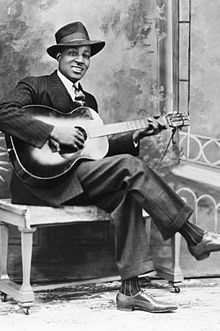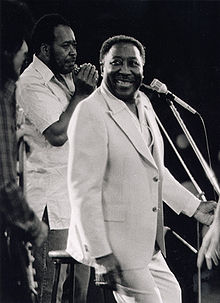
I dreamed I went out with an angel, and had a good time
I dreamed I was satisfied, and nothin’ to worry my mind
But it was just a dream, just a dream I had on my mind
And when I woke up, baby, not an angel could I find
Big Bill Broonzy was an artist who defined the sound of Chicago blues, which in turn was embraced by some of the greatest American blues artists. His popularity soared when he was part of the folk music revival during the 1950’s. Lastly, he was a huge influence on many young British artists that made up the British Invasion of rock and roll in the 1960’s, an influence that is still felt today.
For a person who had such a huge impact on blues music, folk music, and rock and roll, much of Big Bill Broonzy’s early life is a mystery. The date and place of his birth are often disputed, but the general consensus is that he was born in June 1903 in Jefferson County, Arkansas to parents that had been born into slavery. His actual name was Lee Conly Bradley and he was one of seventeen children. It is not known when or why he changed his name.
The first instrument that he learned was the violin, and he played churches, fairs, and clubs around Arkansas before moving to Chicago in the 1920’s. It was in Chicago where he learned to play the guitar and soon the violin was a thing of the past.
By the 1930’s he was one of the earliest proponents of playing in small groups that would later define the sound of Chicago blues. The group would consist of a singer, guitar, piano, bass, and drums. This Chicago sound would be made popular after World War II by blues musicians such as Muddy Waters and Willie Dixon.

His reputation had grown throughout the 30’s to the point that in 1938 he was asked to perform as part of a concert billed as ‘From Spirituals to Swing’ at New York’s Carnegie Hall. This concert was organized by the legendary John Hammond of Columbia Records and was scheduled to take place on December 23. Hammond had originally booked Robert Johnson, but a week before the concert he learned that Johnson had died back in August. Big Bill was brought in at the last minute and traveled by bus from Chicago to New York (after buying a new pair of shoes). This was the first time that Big Bill had ever performed in front of an all-white audience. He performed one song, titled ‘It Was Just A Dream’.
The audience roared with laughter when he sang the lines,
‘Dreamed I was in the White House, sittin’ in the president’s chair.
I dreamed he’s shaking my hand, said “Bill, I’m glad you’re here”.
But that was just a dream. What a dream I had on my mind.
And when I woke up, not a chair could I find’
Big Bill was a hit and invited back the following year and allowed to play two songs. This exposure helped propel his career and he continued to grow in the 1940’s. Broonzy adapted his songwriting style to include an appeal to sophisticated white city dwellers while still maintaining his country roots. He continued to play in bands as the Chicago style of blues grew in popularity. The list of songs both written and performed by Broonzy would become blues standards for decades. Songs like ‘CC Rider’, ‘I Can’t Be Satisfied’, ‘Mean Old World’, ‘Night Time Is The Right Time’, and ‘Key to The Highway’ are songs that are still performed today.
By the 1950’s a folk revival was underway and audiences in the U.S. began clamoring for Big Bill to return to his acoustic ‘folk blues’ roots. Big Bill complied and his performances were well received. Encouraged by this he decided to tour Europe. His performances were met by standing ovations and rave reviews wherever he played, and by the time he returned home to the U.S. he was asked to perform with many popular American folk artists such as Pete Seeger and Sonny Terry. He continued to prosper financially throughout the 1950’s touring worldwide and even publishing his autobiography, ‘Big Bill Blues’. The 1950’s turned out to be the most prosperous of his entire life. Unfortunately in August 1958 he died of throat cancer. Big Bill Broonzy was only 55. He is buried in Lincoln Cemetery in Chicago.
The legacy and influences that he left behind are impressive, yet most people have never heard of Big Bill Broonzy. His influence on blues music and blues players was such that in 1980 he was inducted as part of the initial class into the Blues Hall of Fame along with 20 other blues masters. His tours of Europe and style of guitar playing influenced many British musicians and performers, including John Lennon, who called him a major influence. Other British artists that were heavily influenced by Broonzy include Eric Clapton, Steve Howe, Ronnie Wood, Tom Jones, and Ray Davies of The Kinks. Eric Clapton included a cover of ‘Key To The Highway’ on the great Derek and the Dominos album ‘Layla and Other Assorted Love Songs’ and even covered Big Bill’s song ‘Hey Hey’ on his unplugged album.
Maybe it was his death at an early age that thwarted his legacy. Unlike Robert Johnson Broonzy’s death was not shrouded in mystery and folklore. It’s a shame that as the 1960’s gave birth to the British Invasion he was not around to participate with the artists on which he had such a profound influence. Associations with British artists such as The Rolling Stones and Eric Clapton led to younger audiences discovering blues artists like Muddy Waters and B.B. King, which in turn helped propel these blues artists into the spotlight once again. Big Bill was never allowed that opportunity. When you listen to Big Bill Broonzy perform there is such pureness in his voice and playing that just washes over you. After listening to his music you might dream that you were with an angel, and that you had a good time.
In my next post I’m going to talk about one of the British musicians that Big Bill influenced, along with an interesting parallel between the two artists careers.
I hope you enjoyed this week’s Musical Tree. Feel free to leave suggestions for future articles in the comments. Don’t forget to subscribe to be notified via email when there is a new post.
And you can now follow Tekesmusings on your social media of choice by clicking on the links at the bottom of the page! Until then, follow your passion, stay happy, and be thankful for whatever inspires you.


With the hub of this musical wheel being none other than Broonzy, those are some pretty impressive spokes being influenced: Muddy, Clapton, Wllie Dixon, Steve Howe, et al.. I’m a little surprised by Tom Jones!
I was too – that’s why I had to put him in the wheel…
Do you know why he was called “Big Bill”?
Wow! Great read.
Pingback: Ray Davies – Teke's Musings
What great information. I never knew this history of the blues . Thank you